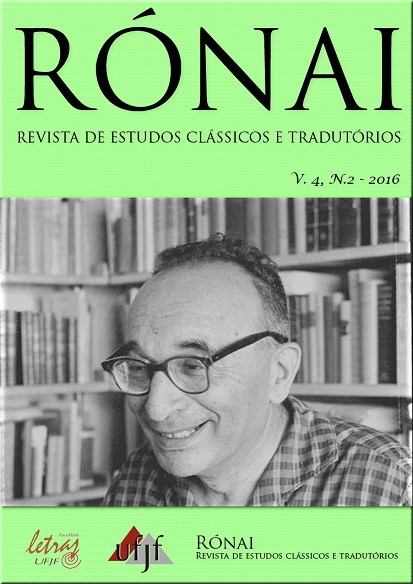O ditirambo e as origens da tragédia
Palavras-chave:
Estudos Clássicos, Poética, Aristóteles, ditirambo, origens da tragédiaResumo
O presente artigo tem por objetivo analisar a passagem 1449a 9-15 da seção IV, da Poética, de Aristóteles, na qual o filósofo declara que a tragédia surgiu τῶν ἐξαρχόντων τὸν διθύραμβον, ou seja, dos iniciadores desse hino cultual, entoado em honra a Dioniso como uma canção ritual que visava à sua adoração. Na análise, observou-se que, para Aristóteles, os solistas do ditirambo forneceram o modelo da colaboração “responsiva”, entre o indivíduo e o coro, que desenvolveria o elemento dialogal e dramático da tragédia.
Downloads
Referências
CSAPO, E. and MILLER, M. C. General Introduction. In: _________. The origins of theater in ancient Greece and beyond: from ritual to drama. Cambridge: Cambridge University Press, 2009. p. 1-38.
ELSE, G. F. Aristotle’s Poetics: the argument. Cambridge, Massachusetts: Harvard University Press, 1957a. 653 p.
__________. The origin and early form of Greek Tragedy. Cambridge, Massachusetts: Harvard University Press, 1967. 102 p.
FLICKINGER, R. C. Introduction. In: ___________. Greek Theatre and its drama. Chicago: University Press, 1918. p. 1-35.
LESKY, A. I problemi dell’origine. In: ________. La poesia tragica dei Greci. Traduzione di Pietro Rosa. Bologna: Società editrice Il Mulino, 1996a. p. 21-68.
_________. A Tragédia Grega. Tradução de J. Guinsburg; Geraldo Gerson de Souza; Alberto Guzik. São Paulo: Editora Perspectiva, 1996b. 360 p.
_________. Los comienzos del drama. In: _______. Historia de la Literatura Griega. Tradução de José M. Díaz Regañón e Beatriz Romero. Madrid: Editorial Gregos, 1985. p. 249-260.
LORD, C. Aristotle’s History of Poetry. Transactions of the American Philological Association, vol. 104, p. 195-229, 1974.
PICKARD-CAMBRIDGE, A. W. Dithyramb, Tragedy and Comedy. London: Clarendon Press Oxford, 1927. 419 p.
SEAFORD, R. From ritual to drama: a concluding statment. In: Csapo, E. and Miller, M. C. The origins of theater in ancient Greece and beyond: from ritual to drama. Cambridge: Cambridge University Press, 2009. p. 379-401.
SCULLION, S. Nothing to do Dionysus: Tragedy Misconceived as Ritual. The Classical Quartely, New Series, vol. 52, n. 1, p. 102-137, 2002.
SOUSA, E. Introdução. In: ARISTÓTELES. Poética. Tradução, prefácio, introdução, comentário e apêndices de Eudoro de Sousa. 7ª ed. Lisboa: Imprensa Nacional-Casa da Moeda, 2003. p. 13-101.
TIERNEY, M. Dionysus, the Dithyramb, and the Origin of Tragedy. An Irish Quarterly Review, vol. 33, n. 131, p. 331-341, September 1944.
Documentação Textual
ARQUILOQUE. Fragments. Texte etabli par François Lasserre; Traduit et commente par Andre Bonnard. Paris: Les Belles Lettres, 1968.
ARISTÓTELES. Poética. Tradução, prefácio, introdução, comentário e apêndices de Eudoro de Sousa. 7ª ed. Lisboa: Imprensa Nacional-Casa da Moeda, 2003.
_____________. Poética. Tradução, introdução e notas de Paulo Pinheiro. São Paulo: Editora 34, 2015.
ATHENAEUS. The Deipnosophists, Books XIII-XIV. English Translation by Charles Burton Gulick. Cambridge, Massachusetts, London: Harvard University Press, 1993.
HERODOTUS. Herodotus, Books I-II. English Translation by A. D. Godley. Cambridge, Massachusetts, London: Harvard University Press, vol. I, 1999.
HOMERO. Ilíada. Tradução de Odorico Mendes. Prefácio e notas verso a verso de Sálvio Nienkötter. Cotia: Ateliê Editorial; Campinas: Editora da Unicamp, 2010.
PLATO. The Republic: Books I-V. English Translation by Paul Shorey. Cambridge, Massachusetts, London: Harvard University Press, 1999.
Suidae Lexicon. Ed. Immanuelis Bekkerl. Berolini: typis et impensis Georgii Reimeri, 1854.
THEMISTII. Orationes ex codice mediolanensi. Emendatae a Guilielmo Dindorfio. Lipsiae: C. Cnobloch, 1832.
__________. The private Orations of Themistius. Translated, annotated, and introduced by Robert J. Penella. Berkeley, Los Angeles, London: University of California Press, 2000.
Downloads
Arquivos adicionais
Publicado
Como Citar
Edição
Seção
Licença
Copyright (c) 2017 Lidiana Garcia Geraldo

Este trabalho está licenciado sob uma licença Creative Commons Attribution 4.0 International License.
Direitos Autorais
Autores que publicam nesta revista concordam com os seguintes termos:
1. Autores e autoras mantém os direitos autorais e concedem à revista o direito de primeira publicação, sendo a publicação licenciada sob a Creative Commons Attribution License 4.0 Internacional.
2. Os autores e autoras têm permissão e são estimulados(as) a publicar e compartilhar o trabalho com reconhecimento da publicação inicial nesta revista.
3. Os autores e autoras dos trabalhos aprovados autorizam a revista a ceder o conteúdo de seus trabalhos, após sua publicação, para reprodução em indexadores de conteúdo, bibliotecas virtuais e similares.
Para mais informações sobre a Creative Commons Attribution 4.0 International License, acessar: https://creativecommons.org/licenses/by/4.0/
Isenção editorial
O conteúdo dos artigos publicados é de inteira e exclusiva responsabilidade de seus autores, não representando a posição oficial da Rónai - Revista de Estudos Clássicos e Literários ou do Faculdade de Letras da Universidade Federal de Juiz de Fora ou das instituições parceiras.



